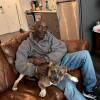This week a random cross-section of 1,000 residents of three Boston neighborhoods will be invited to submit to coronavirus and antibody testing, Mayor Marty Walsh and Massachusetts General Hospital have announced.
The tests — a nasal swap and a finger prick — are meant to help health and city officials understand more about the spread of coronavirus in two of the city’s hardest hit neighborhoods and one where access to testing has been an obstacle, said Marty Martinez, the city’s health and human services chief, in an interview with WGBH News.
“We’ve been committed to making sure that we can increase diagnostic testing, but we also want to better understand who’s infected, the percentage of folks infected and where in our neighborhoods we might have pressing issues,” he said, noting that the test will focus exclusively on asymptomatic individuals in East Boston, Roslindale and parts of Dorchester.
The development comes about a week after MGH conducted similar random testing in Chelsea, a predominately Latino community with the highest infection rate in the state. Results there showed about a third of the 200 asymptomatic residents tested displayed antibodies, suggesting a previous, unknown infection.
“All of the testing to-date has been heavily biased towards symptomatic people … so viral testing gives a skewed version of what might be going on in the population,” said Dr. David N. Louis, MGH’s chief of pathology. The tests, he added, will yield a “less biased view” of the scope of infection in the three communities.
Louis acknowledged that the testing scope would yield only a limited view of what’s happening in the city, but argued data collection needs to start somewhere, and it makes sense to start in an area with a high infection rate.
“When you’re in an area with a higher caseload, the likelihood is that you’re going to find higher numbers of people who have seroconverted,” or developed antibodies, he said. “You could make an argument that knowing what the seroprevalence is in a place that’s had far fewer cases would also be quite informative.”
“This is way better than not doing a study, and this could be an important first step for a larger attempt to answer [coronavirus] questions,” Louis added.
MGH researchers will be using an independently evaluated antibody test from the North Carolina-based BioMedomics to detect coronavirus exposure.
In Boston, researchers aim to test the volunteers over the course of a week. Martinez said city officials chose the three neighborhoods to examine several demographic indicators.
“We want to make sure we have a representation of the cultural and racial diversity of the City of Boston,” said Martinez, describing the rationale behind testing in the northern portion of Dorchester, Boston’s largest neighborhood.
East Boston, where the city’s largest Latino population lives, “has one of the lowest populations per 10,000 people getting tested in the city,” Martinez said. Despite that low rate, the neighborhood has one of the city’s highest percentages of positive results.
Roslindale, one of the city’s southernmost neighborhoods, was selected for “geographic diversity” and its lack of a dedicated testing site.
“With only 1,000 individuals tested, it’s a small pilot,” Martinez acknowledged. “But it’s going to give us more information about the virus and help us look at some of the strategies in these neighborhoods to figure out if there’s more we need to do or do in a different way.”
The testing program was announced as state health officials revealed Massachusetts had reached nearly 55,000 coronavirus cases and 2,899 deaths.


![Graduation 2024[64].jpg](https://cdn.grove.wgbh.org/dims4/default/21b7226/2147483647/strip/true/crop/1358x1358+637+0/resize/100x100!/quality/70/?url=https%3A%2F%2Fk1-prod-gbh.s3.us-east-2.amazonaws.com%2Fbrightspot%2F3a%2Feb%2Fd00d5cf6443ebee7970df751d611%2Fgraduation-202464.jpg)


